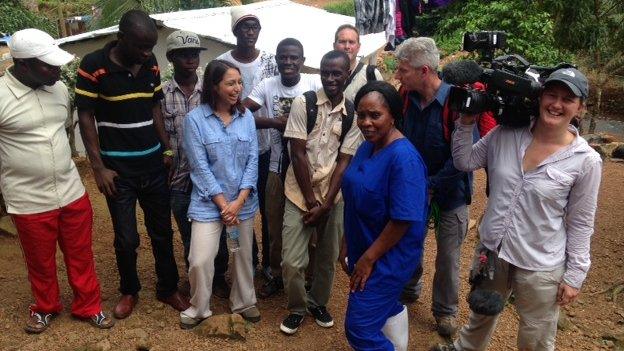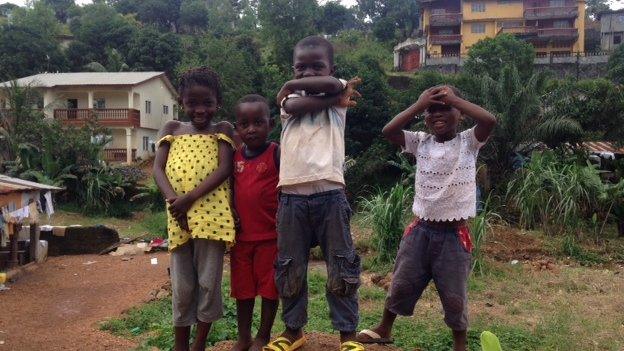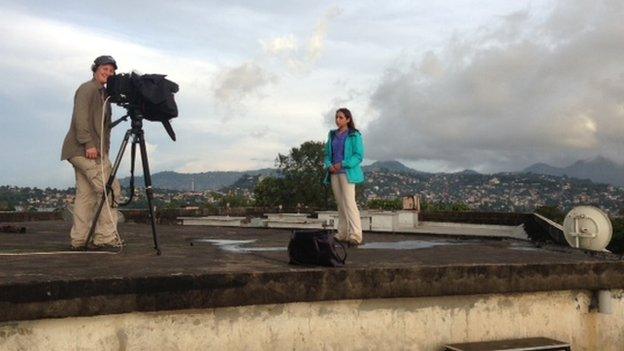'Sadness and desperation - resilience and bravery'
- Published
Burial teams in Sierra Leone are having to scramble over fresh graves to lay bodies to rest, as Tulip Mazumdar reports
BBC global health reporter Tulip Mazumdar shares her experiences from Ebola-stricken Sierra Leone, where UK aid workers will soon be joining the race to stem this deadly disease outbreak.
Day five: The people vs Ebola
Today we're heading into a village just outside Freetown for what's called "community sensitisation". This is about telling people what Ebola is, how to spot it and how to stop it spreading.
We drive down a mud road into a valley where wooden and tin shacks line a small stream. It's a very poor area. We watch women washing clothes in the water, while men wash and shine their motorcycles further upstream.
Save the Children has trained dozens of local volunteers to help deliver important messages about Ebola to this community. Around 50 meet at the local health clinic (the home of a nurse who's converted half her house into a health centre).

The BBC crew filming in a village just outside Freetown
When I arrive, they burst into song. "Welcome, Welcome, Welcome" they bellow out with huge smiles across their faces.
This village, thankfully, hasn't had any Ebola cases so far. But our team has to be very careful. Lots of people gather and there's plenty of jostling.
We have to be extra careful not to bump into anyone. Our biosecurity advisor Mac pulls at my backpack and gently removes me from an excited crowd.
This community is well informed about Ebola. The volunteers have been here before and are following up to see whether people are taking their advice. Children run over and show me how they wash their hands properly, rubbing in-between their fingers.
One woman shouts from her house: "DO NOT TOUCH DEAD BODIES". Her son follows with: "IF SOMEONE IS SICK, TAKE THEM TO HOSPITAL."
They are well drilled and it seems this crucial knowledge is helping keep Ebola away from this community, for now.

Children are taught how to wash their hands properly to guard against Ebola
The community nurse Joyce asks for a photo with our team and her staff. We gather around, all the time everyone shouting and laughing: "No touching, no touching!"
It's midnight, and it's time to head back to the UK. We make the boat journey back from Freetown to Lunghi airport. Washing my hands with chlorine has almost become second nature now, as is standing in line waiting for my temperature to be checked.
The aircraft we board has come with passengers from Liberia. The pilot and the aircrew are all wearing latex gloves. So far, all exported cases from West Africa have arrived into other countries on planes like this one.
It's a sobering thought. My temperature is checked for a final time before I am allowed to board. 36.4C (97.5F).
It's been a tough trip. I've seen so much sadness and desperation, but I've also seen great resilience, dedication, kindness and bravery.
Day four: Live from the Ebola front line
It's an early start today to begin editing the material we've gathered over the past few days. There are lots of different global and UK-based programmes across BBC News, on radio, TV and online, and we want to get the stories from the people we've spoken to out across as many of them as possible.
We set up our live position on the roof of our hotel. Trying to do live reporting from outside the hotel is much more risky because of how widespread Ebola has now become. We don't want crowds gathering around us. Our bio-security adviser, Mac, checks our location is safe, and we set up.
It's been so hectic these past few days, but as I'm getting ready for my first live broadcast, at 17:00 on the BBC News channel, I find a moment to look behind me and take in the incredible view of this beautiful city. I see lush forested hills curving around the gentle Atlantic ocean. The calm doesn't last long though as clouds gather and a storm brews.

After a few false starts and dropping off live programmes mid-sentence because of heavy rain and thunder, our satellite signal comes back, and we're off.
Then soon after 18:00, just as one of the BBC World presenters is about to introduce me live, my producer, Mark, runs over and tells me some terrible news. Francis Samuka, whom we watched being turned away from a treatment centre yesterday, has died. His family has called and told us he passed away at an isolation centre a few hours ago. His sister could barely speak when she was delivering the news, she was wailing with sorrow. My heart sinks... and then I hear the presenter in my earpiece saying: "Tulip, what's the latest?"
I explain what's happened, all the time thinking of Francis' bloodshot eyes and the look of despair I saw in him just the day before.
I am glad we were able to tell Francis Samuka's story. It's important people know this is happening on a daily basis across West Africa. It underlines why governments here and global aid agencies continue to plead for more international help, so patients like Francis can be treated, instead of being turned away.
Day three: Desperation and hope
.jpg)
Suspected Ebola patient Francis sits in the passenger seat while his family try to persuade Italian non-governmental organisation Emergency to admit him to its treatment centre
We've been told about a small Italian non-governmental organisation called Emergency that has very recently set up a new treatment centre just outside the capital, so we're heading there today.
When we pull up, we see a carload of people looking angry and desperate. We stay close to our vehicle - keeping our distance - but shout over to them and ask what's wrong.
"My brother Francis is sick, and they won't take him at this centre. They say they are full. What are we supposed to do? We've been travelling from hospital to hospital all day and no-one will take him."
I peer into the car. Francis is sitting in the passenger seat staring into space. His eyes are red, and he has the hiccups - both are clear symptoms of Ebola. After almost an hour of pleading, the family eventually give up. The five of them pile back into their car and drive away. Everyone in that vehicle is now potentially at risk of catching Ebola.
When we enter the treatment centre, I feel the helplessness and frustration of that family and I demand to know why they didn't allow that potentially dying man inside. Surely they can do something for him. The centre's co-ordinator, Luca Rolla, tells me their priority has to be their staff and the patients they are already treating. He tells me that they cannot go over capacity or they risk everyone else inside the centre. One of their doctors has already contracted the virus and is now being treated in Germany.
It's an impossible choice for these medics, and my frustration quickly pales in comparison to theirs. Luca has taken the family's details and if a bed becomes free anywhere in or around Freetown, he will let them know.
Luca tells me, what's needed right now is more international medics and training of local medics, and more isolation centres. Until then - he says - he will have to continue turning patients away, knowing full well they risk going back into the community and infecting yet more people.
While we're filming, Luca's phone rings, he picks up, smiles and waves us over. He's just had some news that a bed has become available at another centre for the family he had to turn away. He calls them immediately and tells them to go straight there.
Then we see another glimmer of hope. Three young girls are sitting patiently on stools in matching purple sarongs - just beyond the orange protective gates. They have survived Ebola and are getting ready to go home.
.jpg)
Day two: The gravediggers
Today we are filming at the country's main referral hospital - Connaught Hospital in central Freetown. As we enter, I see a woman in a purple and pink shirt lying on a bench, with her head in her hands. She looks extremely unwell. This area is where patients showing symptoms of Ebola come for help, but the help is limited.
This isn't a treatment centre; it's an isolation ward within the hospital. People have to travel many miles from here by ambulance to get proper supportive treatment. There are just 18 beds in this hospital, and they are all full.
The latest patient to arrive is a one-month-old baby. Ebola killed both his parents overnight. The chances are he is also infected and will die within days. All medics can do is feed him and hold him through protective suits. I am reminded of my trip to Guinea a couple of months back, when I was covering this outbreak. Back then, I watched the body of a four-month-old baby lowered into the ground. Ebola also killed his mother. It's heart-breaking to imagine the most likely outcome for this other tiny baby.
.jpg)
People who have died of Ebola must be handled using strong protective clothing and gloves, and they must be buried immediately
As we are leaving the hospital, a black truck pulls up. The burial team is here to remove two bodies and bury them in the nearby cemetery. We watch and then follow the makeshift hearse to these victims' final resting place.
A whole area is cordoned off just for suspected and confirmed Ebola victims. Walking into it is eerie and tragic. There are hundreds of graves, most dug very recently, with fresh mounds of mud on top of them. One or two have a cross or children's toys scattered on them. Most, though, are unmarked. What hits me is the sheer scale - 400 bodies buried here in a matter of weeks.
The burial team is efficient and almost jovial. I imagine it's the only way they can keep performing this grim task day in, day out. The cemetery supervisor, Abdul Rahman Parker, tells me he's been ostracised by his community - people are scared of him now because he handles the bodies of Ebola victims. But he says he doesn't care, and that Sierra Leone needs him to continue doing this job, even if its people don't realise it.
The day ends with the burial teams throwing their protective clothing - gloves, masks and body suits - into the last grave. It's starting to rain again. We remove our protective suits and put them in a yellow biohazard bag, which the burial team disposes of. We spray ourselves with disinfectant, and silently head back to our hotel.
Day one: Welcome to Freetown
It's pitch black when we arrive at Lunghi airport at 01:00 local time, and the rain is coming down heavily. The journey, which before this outbreak took six hours from London, has taken us 20 hours. No airline flies direct to Sierra Leone from the UK anymore, so we have two stopovers - one in Paris and one in Casablanca.
.jpg)
Not that we were in any doubt, but it doesn't take long to establish all is far from well in Sierra Leone.
Before we're allowed into the main terminal building, we are ushered towards two large red containers filled with chlorine. Everyone silently adheres to washing their hands before entering. We're immediately handed "health declaration" forms asking us - among other things - where we've travelled in the past eight weeks and whether we are suffering with fever, diarrhoea or vomiting.
We're also given a leaflet explaining what Ebola is and how it spreads. Disturbing animations show cartoon people squatting, passing blood in their urine and faeces. Similar posters are plastered all through the arrivals hall.
We pass through immigration - but before we are allowed to claim our baggage, men in gloves and white coats stop us again.
One of the men gives me a big, reassuring smile and then places a temperature gauge a few inches from my head. He says: "36.5 degrees: you can pass."
Our driver meets us at arrivals. I instinctively go to shake his hand and then immediately withdraw. He smiles and pats his chest instead - this is the new Sierra Leone handshake. "Welcome to Freetown," he says.
Follow Tulip on Twitter - @TulipMazumdar, external